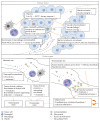Tumor-Induced Local and Systemic Impact on Blood Vessel Function
- PMID: 26770016
- PMCID: PMC4685129
- DOI: 10.1155/2015/418290
Tumor-Induced Local and Systemic Impact on Blood Vessel Function
Abstract
Endothelial dysfunction plays a role in several processes that contribute to cancer-associated mortality. The vessel wall serves as a barrier for metastatic tumor cells, and the integrity and activation status of the endothelium serves as an important defense mechanism against metastasis. In addition, leukocytes, such as cytotoxic T-cells, have to travel across the vessel wall to enter the tumor tissue where they contribute to killing of cancer cells. Tumor cells can alter the characteristics of the endothelium by recruitment of leukocytes such as neutrophils and macrophages, which further stimulate inflammation and promote tumorigenesis. Recent findings also suggest that leukocyte-mediated effects on vascular function are not limited to the primary tumor or tissues that represent metastatic sites. Peripheral organs, such as kidney and heart, also display impaired vascular function in tumor-bearing individuals, potentially contributing to organ failure. Here, we discuss how vascular function is altered in malignant tissue and distant organs in individuals with cancer and how leukocytes function as potent mediators of these tumor-induced effects.
Figures

References
-
- Dirkx A. E. M., Oude Egbrink M. G. A., Kuijpers M. J. E., et al. Tumor angiogenesis modulates leukocyte-vessel wall interactions in vivo by reducing endothelial adhesion molecule expression. Cancer Research. 2003;63(9):2322–2329. - PubMed
Publication types
MeSH terms
LinkOut - more resources
Full Text Sources
Other Literature Sources

